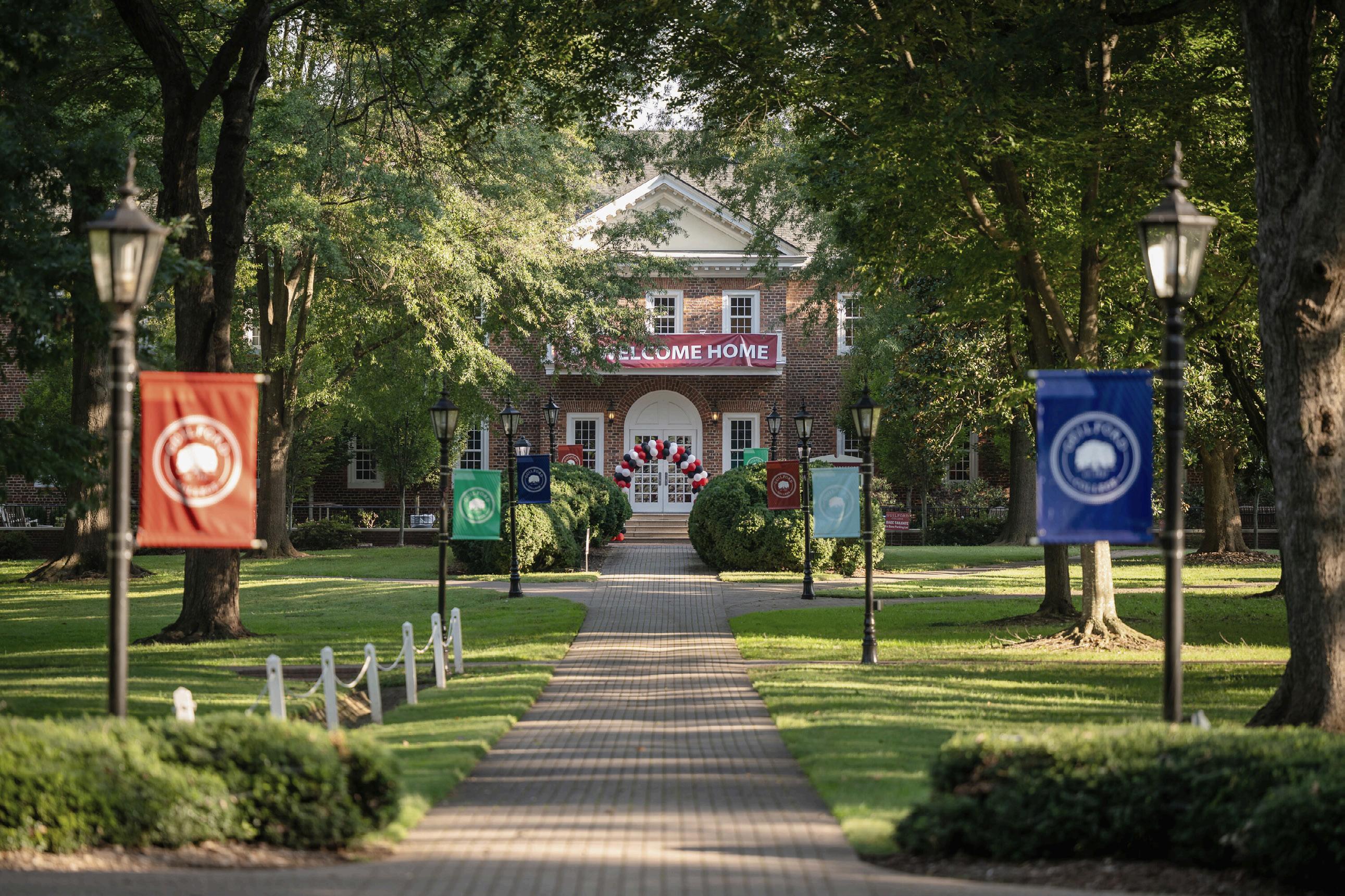
























ON MAY 17, our Class of 2025, surrounded by family and friends, will gather under the oaks, maples and elms that grace Guilford’s Quad to celebrate their achievements and give them their well-earned diplomas. It’s the end of one journey, but more important, the start of another. I can’t wait to share their excitement.
Guilford too is on a journey into a promising future. We are now in a transition to that transformation, a transition that is addressing long-standing and deeprooted financial and operational challenges that persisted alongside an outstanding student experience and excellent academics and athletics.
Simply put, as with many small, tuition-driven liberal arts colleges today, our revenues have not kept pace with expenses. The transition team has worked with employees since January to increase revenues from the primary source, tuition, and from stronger fundraising and other sources. The College is doing the hard work of aligning revenues with expenses for fiscal year 2025, fiscal year 2026 and beyond. We must do this to comply with standards for accreditation with the Southern Association of Colleges and Schools Commission on Colleges, which will make a decision about our membership in December following two years of probation.
Post-COVID, many internal and external forces have brought us to these crossroads: Inadequate budgeting practices, outdated and ineffective finance and
EDITOR
Robert Bell ’11
DESIGN
Chris Ferguson
COMMUNICATIONS & MARKETING TEAM
Ty Buckner, Chief Communications Officer
Robert Bell ’11, Director of Communications
Michael Crouch ’10 & ’12, Director of Brand & Marketing Operations
Ady Franken ’24 ’25 MBA , Presidential Fellow
Aziz Peregrino-Brimah , Digital Content Manager
FUNDRAISING TEAM
Elizabeth Freeze, Senior Director of Philanthropy
Rick Lancaster ’88, Director of Development — Strategic Engagement
Lauren Reinking , Director of Alumni Relations & Engagement
Lindsay Gauldin ’23, Assistant Director of Emerging Gifts
TRANSITION TEAM
Jean Parvin Bordewich , Acting President
Keith Millner '82, Acting Chief Operating Officer
Dan Mosca , Interim Board Chair
Carla Brenner '73, Transition Team member
Paula Sours '76, Transition Team member
CONTACT US
Office of Communications & Marketing
New Garden Hall
Guilford College
5800 West Friendly Avenue Greensboro, NC 27410
P / 336.316.2239 magazine@guilford.edu
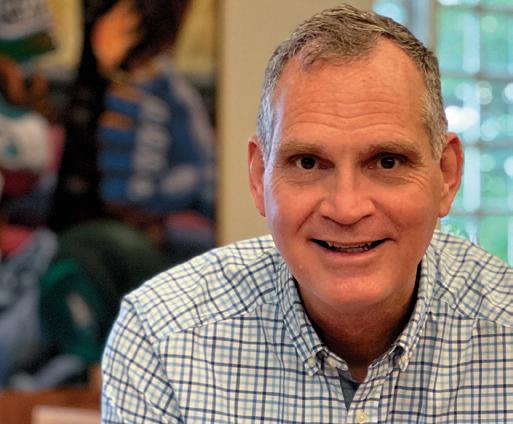
Shhh, I’m going to let you in on a little secret: I’ve got the best job at Guilford. No, really. Every week I get to meet the most fascinating people — faculty, staff, students and alumni — and share their stories with the rest of the Guilford community.
Some of those stories make their way to Guilford College Magazine, which is what you’re reading now. Hearing Guilfordans share their stories and passing them along is a privilege I don’t take lightly. Thank you.


FOLLOW US ON SOCIAL MEDIA! facebook.com/guilfordalumni instagram.com/guilfordalum x.com/guilford_alum linkedin.com/school/guilford-college-alumni
Guilford College Magazine is published by the Office of Communications & Marketing. The views expressed within these pages do not necessarily reflect the opinions of the College.
Guilford College does not discriminate on the basis of sex/gender, age, race, color, creed, religion, national origin, sexual orientation, gender identity, disability, genetic information, military status, veteran status or any other protected category under applicable local, state or federal law, ordinance or regulation. For our complete statement, please visit www.guilford.edu/nondiscrimination
In celebration of Guilford’s 137th year as a four-year college in 2025, we asked you to come up with 137 reasons why you think the College is so special. As usual, you did not disappoint. Starting on page 12, we made a list (and checked it twice) of all the histories, traditions, people and programs that make Guilford College such a wonderful place to grow and learn. In fact, the hardest part was limiting ourselves to just 137. Take a look and let us know what you think. And if we missed a few, feel free to drop me a note

— Robert Bell ’11 Editor


10
6 One generous gift
A Charitable Gift Annuity from
Betsy Bingham Klein ’53 will help future Guilfordians benefit from the College like Betsy did.
8 Beachbots
Guilford students are building AI robots to clean North Carolina beaches.
10 A helping hand
Attorney Steve Arrington ’95 thinks he has the best job in the world. He may be right.
12 The G-list
There are millions of reasons we love Guilford. In honor of our 137th anniversary, here are 137.
24 Right on time
Judith Turner-Yamamoto ’73 wrote her debut novel at 69. Critics say it was worth the wait.

26 One last lesson
Paul Zopf has a few things to say. About Guilford. About Life. Even yellow squash.
30 Like father, like son
Thanks to his father and grandfather, Guilford coach Zach Booker has baseball in his blood.
32 Eyes on the prize
Brittany Drew ’15 isn’t surprised by her new job as a Division I assistant basketball coach. She saw it coming.
34 A national platform
Bryan Dooley ’13 is a member of the President’s Committee for People with Intellectual Disabilities.
36 Remembering a Guilford giant
Bruce Stewart ’61 embodied the best of Guilford.
May 2025
On the Cover
What makes Guilford so unique?
We have a few thoughts — 137 to be exact.

showed that love several years before she died in January.
Betsy gifted the College that helped propel her life and career a $750,000 annuity. Family members smile approvingly when the gift is brought up. “Did my aunt talk about Guilford College much?” asks Ray. “When did she not talk about Guilford? You could tell the friends, the relationships and education she made there meant so much to her.”
After graduating from Guilford, Betsy went on to study theater at Boston University. She moved to New York and performed in some offBroadway productions including the comic opera “Don Pasquale.”
Betsy also worked in the garment industry of New York. She sold clothes to high-end stores like Nieman Marcus and worked closely with Roy Halston
Frowick (known mononymously as Halston, one of America’s top fashion designers). Ray says Betsy’s Brooklyn closets were filled with Halston dresses but not for long. “She was always giving them to friends or family members,” he says.
Betsy’s husband David was an artist who created iconic TWA travel posters highlighting the airline's various destinations. The Kleins frequently visited those far-flung destinations and routinely spent their summers in Southern France.
After David died in 2005, Betsy began thinking about returning to North Carolina. She lived at Friends Homes
across the street from the College and enjoyed reconnecting with classmates and friends.
A charitable gift annuity helps you support Guilford College and feel confident that you have dependable income in your retirement years, says Rick Lancaster ’88, Director of Development — Strategic Engagement.
“It’s a win-win for both Guilford and our donors,” says Rick. “For the College, a charitable gift annuity offers meaningful support and makes a lasting impact. For our donors, annuities help support the College's mission, offer potential tax benefits and provide fixed income for life.” •
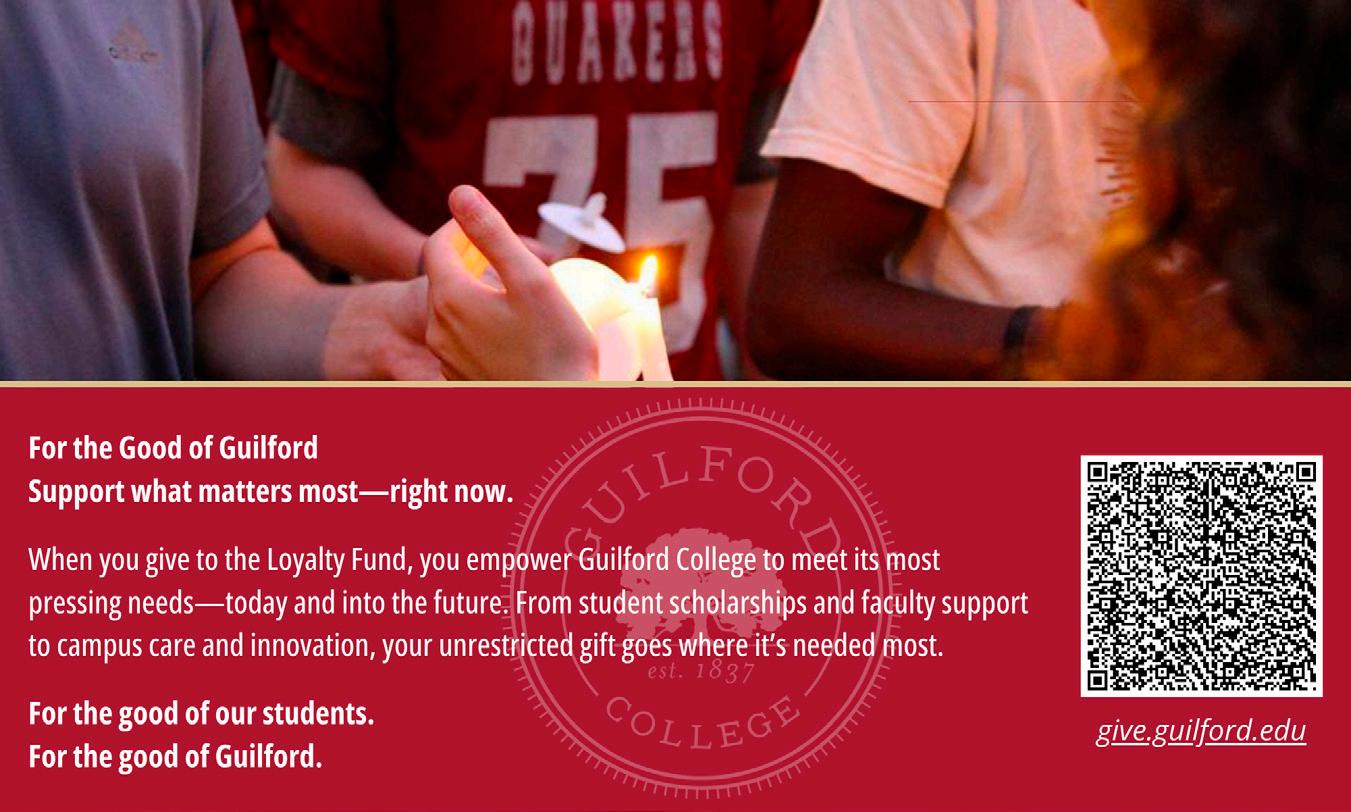

Guilford students are creating artificially intelligent robots to clean our beaches.
IF ONLY BEACHGOERS LEFT BEHIND nothing more than footprints in the sand. Unfortunately, beach litter is a growing issue, threatening coastal environments and the wildlife that depends on them.
In response, a group of students from Guilford College and The Early College at Guilford are developing artificially intelligent robots equipped with image recognition to detect and collect surfacelevel garbage near the shoreline.
It’s the kind of cutting-edge research typically associated with R1 institutions — universities with the
highest level of research activity. But in the basement of Bauman Hall, Guilford students gather weekly to build and refine two prototype robots they hope will become larger, autonomous machines cleaning up North Carolina beaches as early as next year.
“This is work you’d usually see at a major research university,” says Chafic Bou-Saba, Associate Professor of Computing Technology and Information Systems. “But that doesn’t faze our students. They’re showing up with enthusiasm and a real passion for what we’re achieving.”
One of those students is Alex Nunez Palomares ’27, a Computer Technology & Information Systems major. When Alex joined the project, he had limited experience with artificial intelligence and robotics, which is exactly why he applied.
“I wanted to see what I could learn about robots and machine learning,” he says.
“We’re kind of like the robots ourselves — each class, we’re getting smarter.”
Alex hopes to pursue a master’s degree after Guilford and eventually work in robotics. “The more I learn from this project, the more I realize how many different paths I could take in
STEVE ARRINGTON FOUND HIS CALLING AS AN ELDER LAW ATTORNEY. “ I CAN ’ T IMAGINE DOING ANYTHING ELSE, ” HE SAYS.

Steve Arrington was convinced he would one day be a pastor. These days he counsels and comforts others as a successful elder law attorney.
BY ROBERT BELL
IT FLIES ON WEEKENDS , and drags at work. It’s precious today and it’s wasted tomorrow. One minute it’s on our side and the next it’s passing us by. It’s a gift that can heal all wounds, and yet sometimes we kill it.
Time is a shapeshifter — infinite when you’re a kid, elusive when you’re an adult and precious when you’re near death. And ultimately time comes for all of us. Nobody knows this better than Steve Arrington ’95, an elder law attorney in Greensboro who works with older adults and families impacted by the impact of time.
It’s not always easy.
In his almost 20 years helping clients in elder law and estate planning, Steve has made a name in Greensboro and the Triad not only for his knowledge, but his ability to deal tactfully with families at tender crossroads in their lives — when they are sick or aging — and looking for ways to protect themselves, their assets and their family’s interests. He handles the minutiae that helps people plan for disability and Medicaid, while keeping control of their assets. And he does it with heaping doses of compassion and care.
Estate planning isn’t something we think about in our youth — or even middle age. But everyone needs a plan, says Steve, who enjoys finding the right strategy for his clients. The conversations can be difficult but in the end they prove beneficial for everyone.
That includes Steve. Elder law is an extremely rewarding practice for me,” he says. “When I’m able to provide clients with gratification and peace of mind, there’s not a better feeling professionally.”
If it sounds like Steve has found his calling, that's because he has. “I can’t imagine doing anything else,” he says.
Growing up it seemed everyone had Steve’s life mapped out for him. He
still remembers the words his high school band teacher told him after graduation. “Steve,” she told him, “you should be a lawyer.”
It wasn’t the first time he’d heard those words. It was the same advice he received from one of his middle school teachers, who was not the first to impart that wisdom on him. That would be his fourth-grade teacher.
Everyone, it seems, had Steve pegged for law. Well, everyone but Steve.
“ I don't believe in accidents. It wasn’t an accident that I ended up in elder law. I was exposed to it and guided there.”
— Steve Arrington ’95
When it came time to enroll at Guilford, Steve took their counsel under advice and chose to major in … Religious Studies.
It made sense at the time. After high school Steve joined a church in Durham, N.C. Watts Street Baptist Church had a program in which many students from nearby Duke Divinity School worked at the church. “One of the divinity students told me to major in something that really piqued my interest, and Religious Studies and spirituality spoke to me,” he says.
Steve was somewhat convinced that he might want to be a pastor. Over time, however, he learned what many Guilfordians before him already knew: Guilford isn’t just a place where you can learn what it is you want to do. Students come to Guilford to learn who they want to be.
“I just didn’t feel the calling like I thought I would,” says Steve, who met his wife Jennifer Leigh (Propst)
Arrington ’93 at Guilford. “The whole law school and being a lawyer thing was sitting there, still chipping at me in the back of my mind.”
Steve worked as a legal assistant after graduating from Guilford for Judith Behar, a Greensboro lawyer whose former husband, Rudy Behar, taught at Guilford. He remembers Judy juggling her practice with caring for her aging parents, one of whom was receiving care in an assisted living community. “So maybe that’s when the first seed was planted,” he says.
Steve later worked as an assistant at Booth Harrington Johns and Toman, LLP, one of the state’s first firms specializing in elder law.
He didn’t know it at the time, but that Religious Studies degree Steve earned at Guilford was about to pay off. “One of the big things my Guilford professors taught me was to pay attention to the particulars of life,” he says. “I don’t want to get too philosophical here, but I don't believe in accidents. It wasn’t an accident that I ended up in elder law. I was exposed to it and guided there.”
In many ways, Steve says elder law attorneys and pastors are alike.
Most elder law attorneys “are wired a little different from litigators,” says Steve, who sees a crucial need in his profession to serve clients with more compassion and empathy.
“You have to be empathetic, you have to be personable and feel for what they’re going through,” he says. “I’ve sat at the same table with families or spouses crying over what’s happening to their loved one and I’m fighting back tears myself.
“One of the biggest things that I learned at Guilford was learning how to treat others. I’ve tried to apply that not only in my personal life, but my professional life.” •
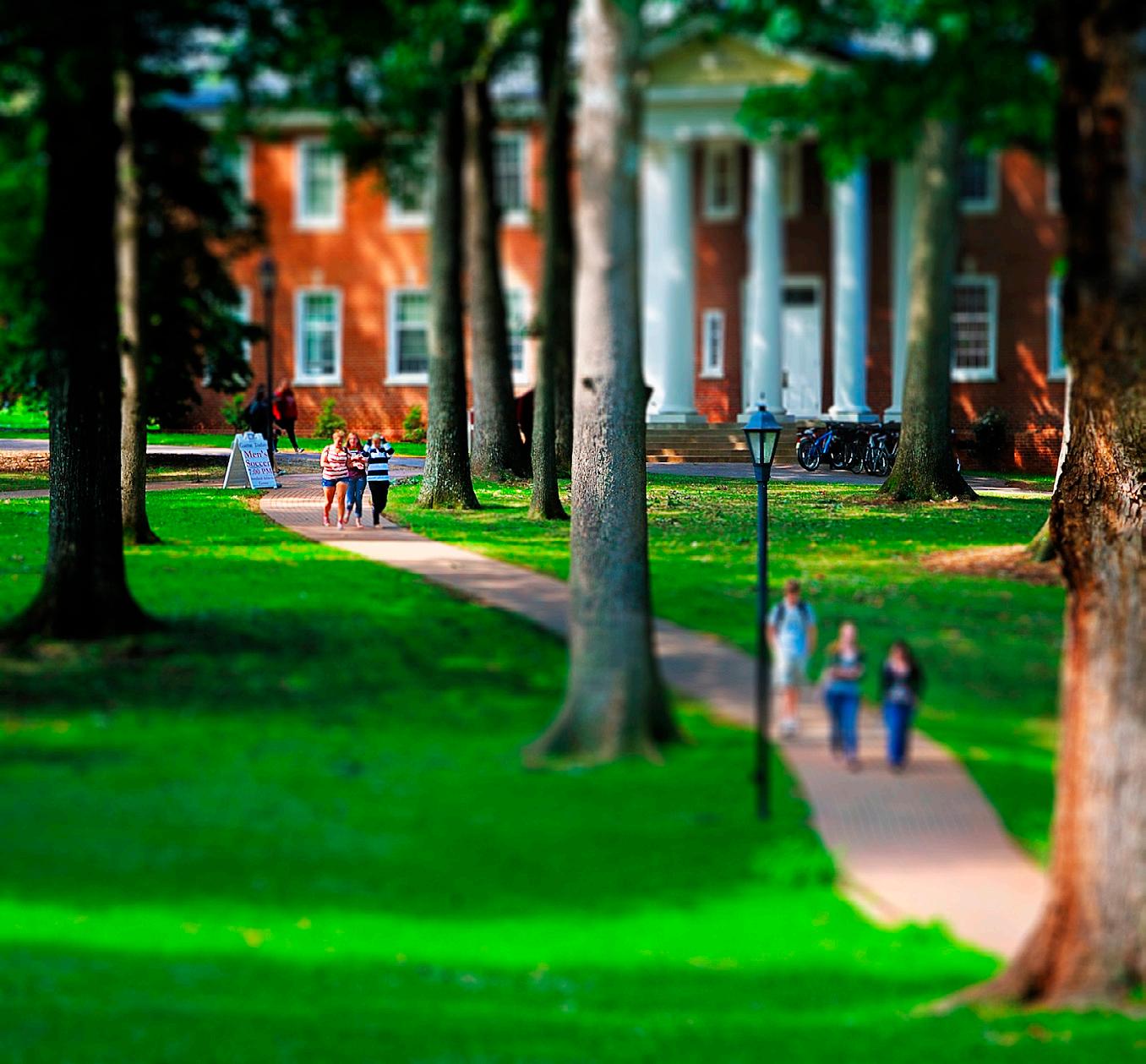
In celebrating our 137th anniversary, we made a list of the many things we love about Guilford. Students, faculty, staff and alumni all weighed in on our traditions, academics, resources — along with reasons we’re excited for our future. Finding 137 REASONS we love Guilford was easy. The hard part was having to leave so many more out.

The Guilford Undergraduate Symposium allows students to share ideas, research and discoveries from the sciences, business,education, humanities and the arts.

“(An) education at Guilford College will equip you with the knowledge, skills, and abilities to make a positive impact on the world.”
—Mandy Cohen, former Director of the Centers for Disease Control and Prevention and 2023 Commencement speaker.
The Early College of Guilford is rated one of the best high schools in North Carolina, and every year ECG students so enjoy learning from Guilford faculty that some of them choose to stick around to finish a college degree here.
After four years of latenight study groups, homecomings and heartto-heart conversations, Edith Shepherd ’71 had an epiphany: Why let graduation get in the way of so many good friendships?
Q: How many trees grace Guilford’s campus?
A: A lot. Live oaks, black oaks, red maples, sycamores, American hollies, tulip poplars, Southern magnolias, black walnuts and so many more. Many are older than the College itself.
friendships endure.
A leader in Quaker research, The Quaker Archives offers the most complete collection of Quaker history south of Philadelphia.
So in 1972, a year after she graduated, Edith and nine other classmates gathered in Greensboro for their own version of homecoming between friends. The next year they did it again. And again.
“There’s no plan for slowing down,” she says. “The Guilford community really is something special. I think it comes from being a school perfect in size and perfect in environment for building a community that cares for each other. There’s really no other college like it.”
WQFS radio started as a low-power carrier current station in Binford Hall in 1964, but is now a 1,900watt, student-run station that broadcasts across the city from Founders Hall.
Fifty-two (and counting) years later, the women of English Hall still meet to share memories and laughs. The conversations have changed over the years — from starting families and new jobs to bragging on grandchildren and comparing hip replacements — but the
Mary Ellen Cathey was more than a cook and caretaker to the women of Mary Hobbs Hall. She was a shoulder to cry on, a mentor for guidance, and a friend to confide in. From Federal Reserve Bank Presidents to CEOs of major corporations, Guilford’s annual Business Summit brings together government
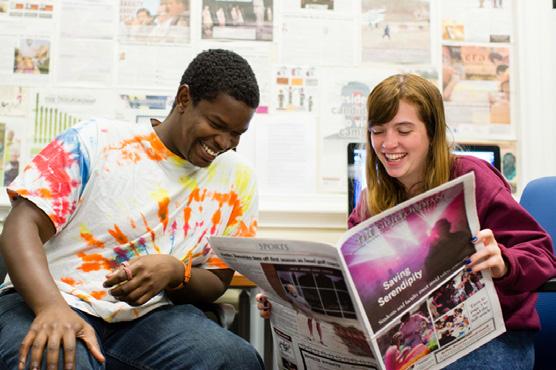
and business leaders to focus on key issues impacting North Carolina and the nation’s economy.
▲ The Guilfordian , the College’s award-winning, student-run newspaper, has been an independent voice on campus for 111 years.
The Greenleaf Review, print literature publication publishes awe-inspiring poetry, short stories, screenplays, artwork and photography from our emerging authors and artists.
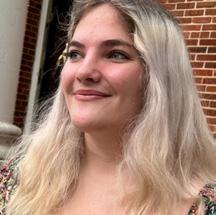
“Guilford professors have a wonderful ability to inspire. They give you room to grow and their critical evaluations of your work make you want to do and be better.”
— Emma English ’21
Every year Bonner students complete nearly 1,000 hours of service learning, an extraordinary commitment to civic engagement and social change.
Guilford welcomes back alumni every spring for their Golden Circle Reunion 50 years after graduating.

The Quaker Cupboard is a free food shelter for all Guilford students experiencing food insecurity. The cupboard is stocked by faculty, staff, students and alumni.
Lewis Lyndon Hobbs ▲ 1888-1915
Thomas Newlin 1915-1917
Raymond Binford 1918-1934
Clyde Milner 1934-1965
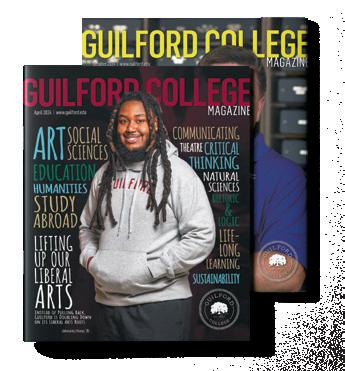
Guilford’s Forensic Science program is a popular track. Students learn how to examine and analyze evidence from crime scenes to develop objective findings. Guilford's Lavender Ceremony gives the College’s LGBTQ+ students the opportunity to participate in a graduation ceremony that celebrates their community.
▲ Our alumni magazine has been around since 1908. In 1996, we changed its name to Guilford College Magazine, which you’re reading right now!
Grimsley Hobbs ’47 1965-1980
William Rogers 1980-1996
Donald McNemar 1996-2002
Kent Chabotar 2002-2014
Jane Fernandes 2014-2020
Kyle Farmbry 2022-2024
A champion of diversity and social justice, Bruce Stewart ’61 modeled Guilford and Quaker values every day. Read more about Bruce on page 36.
Lucy Selby ’24 loved being immersed in Guilford’s Honors program. “I could really dive deeper into what I was studying,” she says. “Having a community where I could ask questions was comfortable and made me feel at home.”
A few of our favorite sports memories:
Jordan Snipes ’07 rebounded a free throw with 0.6 of a second left and, from just inside the baseline, heaved a Hail Mary toward Randolph-Macon's basket…swish! Jordan’s basket not only gave Guilford a 90-89 men’s basketball win at RandolphMacon, it made ESPN SportsCenter’s list of Top 10 plays that evening.
Twice as nice. It’s hard to improve on winning your first NCAA Division III National Men’s Golf Championship like Guilford did in 2002. But two years later, the Quakers did it again — and with sophomore Colin Clark ’07 winning medalist honors. Including an NAIA title, Guilford has won three national championships in the sport.
Remember when M.L. Carr ‘73, World B. Free ‘76, and their teammates won five games in six days to capture the 1973 NAIA National Basketball Championship? We do!
Year after year Guilford’s classical guitar program produces some of the best young artists in the country.

“New ideas and new solutions – and the leaders who deliver them – will come from schools that produce independent, critical thinkers like Guilford College.” —
Former Washington Post Pulitzer Prize winning columnist Eugene Robinson, who spoke at Guilford in 2022.
The Dave Matthews Band performed at the Dana Auditorium. As did Bonnie Raitt. Sidney Poitier spoke there. So did Madeleine Albright.
The Center for Principled Learning and Excellence in Teaching empowers students to tackle realworld challenges through ethical leadership, collaboration, and innovation. Everyone — even the President and faculty — at Guilford answer to their first names. It’s emblematic of
Guilford’s commitment to an egalitarian approach to community. From music to food to streaking, Serendipity, which began in 1972, has changed with the times and continues to be a featured event of the spring for students. ▲

Zack Hample ’00 has caught more than 12,000 baseballs at Major League Baseball games, including Mike Trout’s first home run and Barry Bonds’s 724th home run. Every September, Guilford’s Passing of the Light ceremony outside Founders Hall invites new students into Guilford's close-knit community, where we seek to understand and live in the world in a different way. The sloping ground in front of King Hall provides a natural amphitheater each spring to celebrate our newest graduates at commencement.
Through mentorship and advocacy, members of the Black Alumni Of Guilford College foster legacy, support students, and enhance the impact of our Black alumni network.
Nearly half of our students play a sport. The Forbes Sports Center in Alumni Gym offers them a flexible space in which to relax and learn.

“Guilford opened so many doors for me as a student. Even after I graduated the professors were still there for me to turn to in my career.”
— Barbara Leland ’74
the connection between Guilford and the wider Quaker community.
to Founders
Sustainable Food System majors get hands-on at the Guilford Farm, the College’s 3-acre organic farm, a learning laboratory that spotlights the College’s commitment to sustainability and provides produce for dining services on campus.
techniques using the latest technology. Community. Diversity. Equality. Excellence. Integrity. Justice.
Stewardship. Our core values aren’t just preached, they’re practiced. Every day.
In the classroom and out.
Sparks fly when students take advantage of Guilford’s Learning and Writing Center. Ideas take shape. Confidence soars. Communication and critical thinking skills grow for success. In college and beyond.
The national honor society—Omicron Delta Kappa—is for students who demonstrate leadership in academic research, athletics, service to campus and community, communications or creative and performing arts.
Wiser Justice Program students and faculty provide incarcerated learners education and advocacy and, most important of all, brighter futures.
Grab a drink or snack and slide into a rocking chair on the Paul E. Zopf Jr. and Evelyn M. Zopf Gazebo and enjoy the view. Heaven on earth.
Friends Center builds community, fosters faith, peace and justice, inspires service and helps sustain
The Business Department offers degrees in highpaying, high-demand jobs like accounting, finance and investment banking and research analysis. The College recently added an MBA program.
Dropping by Mary Hobbs Hall is like seeing an old friend. Generations of Guilfordians love its cozy charm and late-night chats. And who could forget those legendary dinners?
The Quaker Leadership Scholars Program fosters spiritual growth, academic study, community building along with service and social justice opportunities.

The newly renovated Duke Hall’s Leak Room space allows our innovative instructors to experiment with new pedagogical
“A lot of people go to college to learn what it is they want to do. People come to Guilford to learn who they want to be.”
—Jacob Mitchell ’25

Guilford partners with Elon University School of Law to create an accelerated pathway for students interested in pursuing legal careers as early as their junior year.
J. Donald Cline ’78 Observatory on the roof of the Frank Family Science Center – which is 25 years old this year – offers a direct window on the heavens.
supporters by enshrining them into the College’s Athletics Hall of Fame. Guilford is one of only a few colleges in the country to hold a grant from the Margaret A. Cargill Foundation. Funds from this grant provide scholarships for study abroad and internship opportunities related to the environment.
“You can’t attend Guilford and not be changed. The community is great, but Guilford’s faculty and staff are even greater. I’ve never experienced professors and other people who so genuinely care about me as a person.”
— Ariel Patterson ’26
Guilford loves firstgeneration students. More than a third of this year’s class are the first in their family to attend college. Faculty and staff are committed to showing them they belong and are capable of accomplishing their academic and personal goals.
Guilford’s master’s programs in Criminal Justice, Business Administration and International Sport Management are perfect for recent graduates and adult learners alike.
Every fall Guilford honors former student-athletes, coaches, administrators and
Our mild temperatures mean it’s not unusual to find our quad double as a classroom any time of the year.
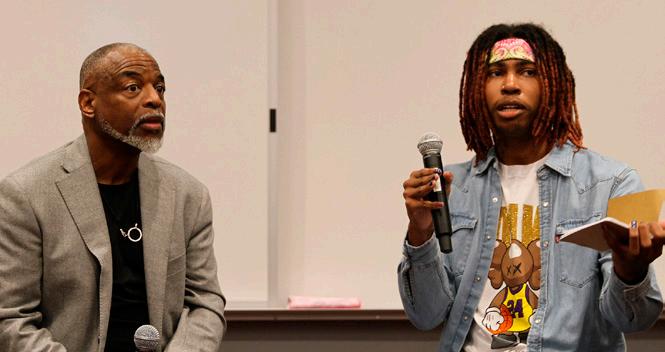
Guilford’s Senior Contribution project is a unique capstone experience where students apply their learning to address a question or problem, culminating in a project like a research paper, performance or community service. Location! Location! We’re three hours from the beach and two hours from the mountains.
We don’t like to name drop, but look who our students have rubbed elbows with: Anderson Cooper. Malcolm Gladwell. Kareem Adbul-Jabbar. Anne Lamott. José Andrés. George Takei. Tom Brokaw. J Wilson ’25, a Theatre Studies major, moderated a lively discussion with actor LeVar Burton (far left, with Wilson) last fall. “I grew up reading about him and watching him on TV and then I came to Guilford and had the opportunity to talk to him. I took so much away from that one hour. I don’t think I’ll ever forget it.”
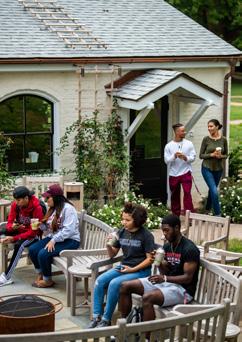
Guilford has a tree that was germinated on the moon. In 1995, Guilford planted a "Half Moon Tree," grown from a descendant of seeds that traveled to the moon on Apollo 14 in 1971. The sapling was damaged before planting near Hege-Cox Hall, leaving it with a permanent bend but remains a living link to space exploration. ▲ Rachel’s Rose Cottage is the perfect civilized start to any hectic day. The caramel macchiato and chocolate croissant will get you psyched for that psych exam.
"Guilford is part of who I am. People that I normally wouldn't have chilled with back home I was like hanging out with on weekends. Now those experiences find their way into my music."
— Grammy nominated hip hop artist Beau Young Prince ‘10
Don’t let the name fool you. The Yachting Club is for students interested
in games, comics, books, fantasy and science fiction. Almost anything but yachts. Who says you have to be an upperclassman to do research? At Guilford we let our first-years and sophomores in on the fun, too.
Jennifer King ’05, is a Chicago Bears assistant coach.
Rick Goings ’70 retired Tupperware CEO
Howard Coble ’53 served as a U.S. Congressman for 30 years
Tony Ward ’88 was vice presidentmarketing of SONY BMG
Deena Zaru Pettiford ’10 is an ABC News reporter and producer
We’d need overtime to list all the teams and conferences our Sport Management majors intern with. From the Atlantic Coast Conference to the Philadelphia Phillies, Carolina Panthers, New York Giants and so much more.

There’s only one college or university in Greensboro that can boast of having its own lake on campus. For more than 70 years students have enjoyed relaxing spring and autumn days by the lake. Ducks, too.
Dave Odom ’64, was the men’s basketball coach at the University of South Carolina and Wake Forest M.L. Carr ’73, is a former Boston Celtics player, head coach and general manager
Joseph M. Bryan Jr. ’60, is a community leader and philanthropist
Hunter Yurachek ’90 is the University of Arkansas athletic director
Ronnie Lowenstein ’73 is the former Director of the New York City Independent Budget Office
Ira Ross ’61 is a retired executive director at Morgan Stanley
Tony Womack ’92 is a retired major league baseball player
Tom Glesne ’87 is a laser physicist at the NASA Goddard Space Flight Center
William Queen ’81 is the author of New York Times bestseller Under and Alone
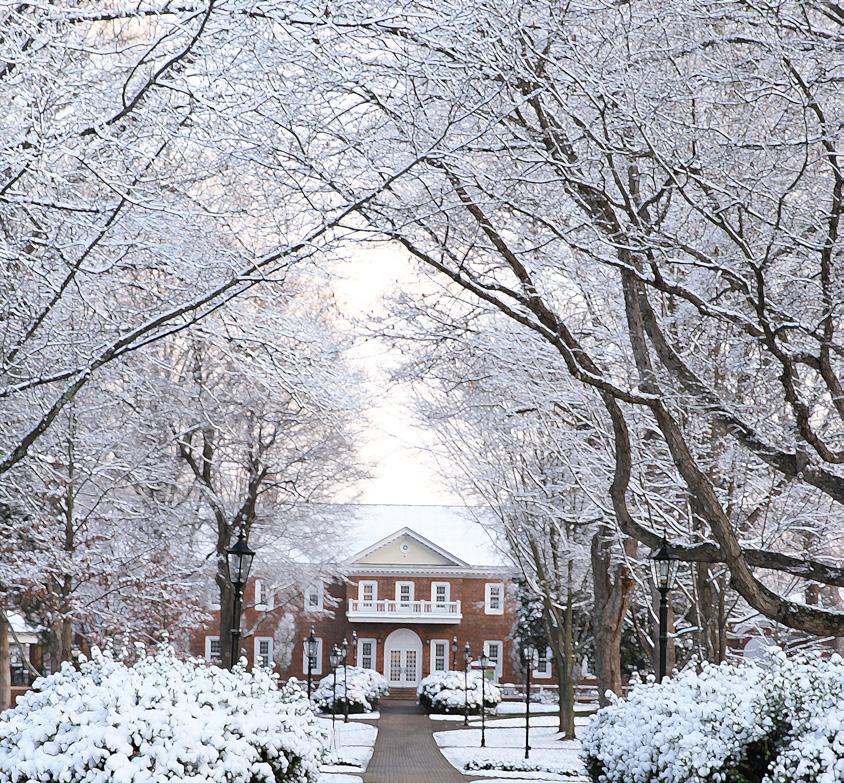
Where better to experience our seasons than the Quad? Changing leaves in the fall, snowmen (sometimes) in the winter, daffodils (always) in the spring, and sunshine in the summer.
Guilford is routinely recognized as one of America’s most welcoming colleges and universities for LGBTQ+ students. The teaching and practice of social justice at Guilford is unparalleled.
We’re one of 15 colleges and universities founded by the Society of Friends. Guilford is the only school in North Carolina listed in the popular guidebook "Colleges that Change Lives."
Japan, Spain, Germany, England, Mexico. When it comes to studying abroad, Guilfordians are going places.
You can’t beat the mentors that come with a Guilford education. Our faculty and staff are passionate and eager to help students along their career paths.
"Guilford changed me. I don't mean they educated or trained me, though they certainly have done that. I mean they changed me as a person. I wonder if other students can say that about their college."
— Pascal Pampu ‘26
We’re a small school with a support system. You never have to feel like you’re slipping between the cracks, because Guilford is made up of people dedicated to seeing you succeed.
We’re not just a college, we’re a community. Guilford’s culture is one that welcomes students from across Friendly Avenue to across the world. There’s more to life than your major. Guilford has a welding art class. And an 18th-century woodworking class, too!
No graduate assistants here — 100 percent of our classes are taught by professors.
More than half our students are people of color. You’ll find an environment that embraces and celebrates cultural diversity.
Financial aid at Guilford comes in the form of institutional scholarships and grants. Every student
Fifty years later, Richie Zweigenhaft and his basketball buddies still got game.
AS TIPOFF APPROACHES , Richie Zweigenhaft shuffles onto the side court at Ragan-Brown Field House ready for a game of pickup basketball. Or at least as ready for a game of pickup basketball as you can be for someone who turned 80 this month.
He takes short jumpers and layups and gradually makes his way to the three-point line. Other geezers adjust knee braces and elbow guards, tools of the trade for betraying time.
About that word geezers: it is a badge of honor to these men in shorts. Geezerball, as Richie coined the game years back, is the unofficial longest pickup basketball game in the country. The players have come and gone but the pickup game has endured for 50 years.
You read that right: 50 years. That’s a lot of jump shots, fast breaks and bounce passes. As the years went by it’s also been a lot of knee and hip replacements. Mostly, though, it’s a lot of passion and, if you’re fortunate, some talent and teamwork, and for some of the lunchtime ballers the forging of some deep and unlikely friendships.
“Never thought we’d be playing 50 years,” says Richie, the Charles A. Dana Professor of Psychology emeritus who helped start the pickup game back in 1975 shortly after he began teaching. “When someone retires from the game, we manage to find new players and keep the game going. It’s like nobody wants it to end.”
There are no illusions here. Their high school games are memories, and the players are good with that. There’s
no dunking. That’s less a rule and more a physical limitation. In a nod to another time there’s also passing. Sometimes as many as six before a shot goes off. They don’t bother with a scoreboard. No refs either. Many of the Geezers are sluggish, taking careful jump shots as opposed to riskier drives to the basket. Younger players in their 30s or 40s do not hold back.
The games that unfold twice a week
“ Never thought we’d be playing 50 years later. When someone retires from the game, we manage to find new players and keep the game going. It’s like nobody wants it to end.”
— Richie Zweigenhaft
have an everyman feel and can be personified in Richie’s jumper. The Methuselah of the Geezers has four limbs. Except when he shoots none of them seem interested in the same goal. His legs barely leave the ground. His guide hand seems to be guiding something other than the basketball. His shooting hand surrounds the ball before pushing it away.
The shot? It finds the net. And then again, and again. “I’m not as graceful as I was 50 years ago, but I can still compete,” he says.
And while winning is the goal, the final score sometimes seems incidental. The basketball court is a sanctuary — a space that provides undisturbed fellowship, camaraderie and a healthy outlet for the week’s frustration.
There was a time when Geezerball wasn’t Geezerball, but just a friendly game among Guilford faculty and some of their students. In the spring of 1975, Religious Studies professors John Stoneburner and Mel Keiser invited Richie and a group of students to a Wednesday game in Alumni Gym.
Richie remembers that game the way others remember a first date. “It was such a good time we decided to do it again the next week,” he says.
Over the years the game became coed with the addition of the late Claire Morse, a Psychology professor. Richie says Claire brought more than just an oppressive defense to the court.
“Claire had a civilizing influence on the game,” says Richie. “The guys were less likely to be assholes.”
When they’re not on the court, the Geezers are professors and doctors, editors and executives, blue-collar workers and small business owners. Every week they show up to break a sweat. In doing so they also found, in small and big ways, they have much more in common than the love of the game.
“I guess it’s more than a basketball court,” says Charles Johnson, a retired vice-president and general manager for a Greensboro construction company. “We don’t talk much on the court, but on the sidelines when two people are

out or we’re warming up? Sure, we joke around and chat.”
That sports can unite people of disparate backgrounds is hardly revelatory, but the courts in Alumni Gym and Ragan-Brown Field House have become something of a public square, where a diverse community has formed across socioeconomic, generational and political lines.
Yes, even politics. Of course it helps that opinions on all things political are left in the parking lot. That wasn’t an edict handed down by Richie — more like a collective decision by the
players — but he thinks the absence of politics has kept the game alive in such divisive times.
“After the 2016 election people, for whatever reasons, didn't talk much about politics,” he says. “I think that's worked in favor of the longevity of the game. We clearly have people who have different political viewpoints, but we've chosen not to have discussions or debates or arguments about why people do or do not like Trump.”
Richie explored the pickup game and the relationships that have grown from it in a 2020 book. Geezerball:
North Carolina Basketball at its Eldest
The book is equal parts a history of the game and memoir. In 2023, with the game approaching its 50th anniversary, Richie penned an addendum.
That’s not to say he’s written the last chapter. The idea of losing the ritual and the relationships of the past 50 years occasionally crosses his mind. He plays pickleball, too, and when he’s finished a singles game he comes home exhausted. “It’s a good workout,” he says, “But it’s not like being out on the court with friends. I don’t think that can ever really be replaced.” •
YOU MIGHT THINK that at 72 years old, Judith Turner-Yamamoto ’75 is a literary late bloomer — that the seed for her acclaimed novel, Loving the Dead and Gone, an absorbing account of how death and tragedy bind together North Carolina women in two rural towns, was planted years ago while Judith waited for the story — her story — to germinate.
You’d be wrong, of course. While the media fawns over the Rowlings, Grishams and Lees of the literary world, it's rare for an author to receive widespread acclaim right out of the gate. Most, like Judith, have spent years writing (and rewriting) in the shadows before stepping into the light.
So how does a first-time novelist launch a book to such heights?
“This isn’t so much a storyline of procrastination as it is one of tenacity,”
Judith says. “We hear about those rare, break-through authors, but the rest of us are toiling in the trenches for years.”
Maybe so, but not every debut novel receives the kind of acclaim that Loving the Dead and Gone did when it was released in 2023. The book was a Gold Medal recipient at the Independent Publisher Book Awards, a finalist for the First Horizon Debut Novel and The Eric Hoffer Award, and won the North Carolina Society of Historians Historical Book Award.
And while this may be Judith’s first novel, writing is hardly new to her. She has authored more than 1,000 articles for publications such as the Los Angeles Times, Elle, and Travel + Leisure
“Writing has always been a part of me and who I am,” she says.
Even as a teenager she was convinced she had stories to tell. Just as importantly, she knew she had the resolve to tell them.
Judith recalls her father, near the end of his life, telling the story of her first
bicycle with training wheels. One day, unexpectedly, he removed them and threatened to return the bicycle to the store if she didn’t learn to ride before he came home from work.
“I spent all day riding and falling, getting up and riding some more,” Judith says. “I skinned both knees, but by dark, I learned to ride on my own.”
The allegory is not lost on Judith. “I don’t remember the day, but I can certainly see that toughness in me as a child because I had the tenacity to see this book through as an adult,” she says.
Loving the Dead and Gone can be traced to 1989 when Judith wrote it as a series of short stories before her first
“ It’s said so many times because it’s true. Guilford’s greatest gift is that it teaches you how to think and find your own gifts.”
— Judith Turner-Yamamoto ’75
literary agent convinced her to weave them into a more cohesive novel.
Over the years, she would write and set the book aside, then return to it. She could have easily given up were it not for that persistent muse — or muses — within. “I just kept hearing voices, and there were stories that demanded to be told,” she says.
Along the way, Judith wrote short stories and received fellowships for her work. “Those were signposts and breadcrumbs — affirmations for me to keep going,” she says. “Maybe others would see those signs or crumbs and want to give up, but if you don’t have grit, you can’t do this.”
She credits now-retired Hege
Professor of Art Adele Wayman as an early source of affirmation in her writing. She remembers Adele pulling her aside during an art class her junior year after reading one of her papers. “‘I love your writing,’” Judith recalls Adele saying. “‘You really should think about being an art critic.’”
Judith has spent a lifetime working in galleries, cultural nonprofits and museums, all while writing art reviews for local publications. Art, dance, music, books, travel, food — no subject is outside her comfort zone.
At Guilford, Judith was a double major in Spanish and Art History. You might assume she also minored in Creative Writing or English. Again, you’d be wrong. It was French. Not a single writing discipline to lean on and Judith wouldn’t have it any other way.
“Isn’t that the beauty of a liberal arts education?” she says. “It’s said so many times because it’s true. Guilford’s greatest gift is that it teaches you how to think and find your own gifts.”
Like most authors, you can draw a Venn diagram of Judith’s life and the characters in her book, and there is plenty of overlap. She says writing about growing up in a fractured family, with parents who were unfaithful to each other and detached from parental responsibilities, was “totally cathartic.”
Judith is 72 now. Loving the Dead and Gone isn’t her last story — just the latest. It’s the first of a trilogy she has planned. Back home in Cincinnati, she has several journals filled with stories and scenes waiting to be stitched together for another book.
“Everything’s there,” she says. “Maybe it’s a few notes on what a character is thinking. Maybe it’s an argument with my husband I wrote down and can give to a character. All of it flows into my writing. It’s all waiting to come out.” •
At 93, Paul Zopf doesn’t get around like he used to. But one of Guilford’s favorite professors still has a few things to say. About Guilford. About life. Even squash.
THE LAND IS TILLED , the seeds are planted. The old man is pleased. He wakes up every morning and sees his garden beyond the bedroom window. There is not much to look at — not now at least. The April ground is brown and bare, but this is not the old man’s first garden. He has been tilling and planting since he was 6 years old. He knows life is stirring below the surface.
That’s not all he knows.
“I can’t think of a more optimistic enterprise than to plant a garden,” Paul Zopf says. “There’s no guarantee I’ll be around to harvest anything, but I’m going to weed, I’m going to water and I’m going to look after it because that garden keeps me going. Just talking about it gives me vigor.”
Leave it to one of Guilford College’s most profound and popular faculty members to bring meaning to a naked garden so late in his own season. Even now, all these years later, Paul is teaching, still offering lessons masquerading as conversations.
Friends and alums who drop by his colonial house on George White Road say the Charles A. Dana Professor of Sociology & Anthropology emeritus is just as engaging, just as selfdeprecating at 93 as he was 66 years ago when he first stepped on campus. His declining health hasn’t slowed his wisdom and wit. “I used to comb my hair,” Paul says. “Now I count them.” See?
Get Paul on the right topic, and that wobbly voice grows in strength overwhelming the room with the cadence of a Baptist minister bent on saving lost souls. On a recent spring afternoon, he turned an audience of one in his living room into a classroom for nearly three hours.
With the greatest of ease Paul weaves together his Quaker faith, his beloved late wife Evelyn, and, of course, Guilford, his mistress all these years.
About the latter: Inevitably memories from his time at the College always come up when the phone rings. His recollections have grown into long stories, but no one complains. Everyone who drops by the way old friends do says Paul is doing great.
“Talking with him is one of the highlights of my week,” says Karen Blum ’72, who writes to Paul faithfully and calls several times a month. “We always reminisce and laugh together like we’re back at Guilford.”
These days Paul shuffles from room to room and scribbles his doctors’ appointments on the pages of a tiny black notebook he carries with him. But as much as Paul knows his limitations, he is also aware of his obligations. He sees it almost as his duty to be an unapologetic champion of a liberal arts education, particularly one at Guilford. Higher education — a liberal arts education in particular — is in the crosshairs of skeptical parents and


politicians. This does not sit well with the professor. “We live in a materialistic and career-oriented world and colleges are responding to that demand,” he says. “I suppose it makes good business sense if I’m paying that kind of money to send my child to college.”
Yet in the next breath, Paul will tell you that students are not objects to be shaped and commodified and sent down a conveyor belt like so many widgets. Not at Guilford.
Any college can teach Accounting, he says. “It takes a liberal arts school like Guilford to teach a student how to think, how to evaluate, how to be an independent critic. Guilford gives you the knowledge not just to be an accountant but also trains your mind to think about the world and workplace and the problems inherent to both in a manner that can’t be learned from a textbook. That still means something.”
Paul and Evelyn moved to Greensboro in 1959, lured by the opportunity to teach (not lecture) students. It helped that only a few years earlier Paul, the son of German Baptists, and Evelyn, whose parents were southern Baptists, began exploring Quakerism after they met at the University of Florida.
They became convinced Quakers and joined the New Garden Friends Meeting shortly after settling in at Guilford. “Their Peace Testimony, their position on race and ethnicity, it all made perfect sense to us,” says Paul.
He has been a faithful member ever since — even more so after Evelyn died eight years ago and the pandemic that followed. At a time when the world was asked to keep six feet apart, Paul realized the importance of staying close.
“I needed the nurturing of the other people who were Friends, and I needed
“ It takes a liberal arts school like Guilford to teach a student how to think, how to evaluate, how to be an independent critic. Guilford gives you the knowledge not just to be an accountant but also trains your mind to think about the world and workplace and the problems inherent to both in a manner that can’t be learned from a textbook. That still means something. ”
— Paul Zopf
that spiritual feeling as well,” he says. “Quakerism is founded on the notion that there is something of God in every person and I believe that. In my own way, I experience that, and it is most acutely experienced in me when I’m around others, not here by myself in this house.”
About that house: Karen says many female students came knocking in the 1960s and ‘70s and it wasn’t to hear Paul’s wisdom on America’s mortality patterns and trends.
"He was so cute and attractive,” she says. “I don’t know how many hundreds of young women had secretly fallen in love with Paul in the classroom and gone over to the house to get a glimpse of Evelyn because they were convinced Paul could do better with them,” she says laughing. “They hosted so many parties and Evelyn was the perfect hostess. She knew how the students felt about Paul, but she also knew she didn’t
have to worry. They were so in love.”
Evelyn died in 2016, following a series of strokes. A day doesn’t go by where Paul doesn’t think about her.
There’s an oil painting of her in the living room over the fireplace. Evelyn is wearing a green dress with a hint of a smile, forever 32.
Paul says the smile does not do his Evelyn justice. “She laughed a lot, she smiled a lot, a big, infectious smile,” he says. He smiles himself, like a slice of watermelon, to show a visitor. Almost as soon as it appears, the smile is gone and Paul looks down.
“She was the best thing to ever happen to me,” he says.
Shortly after they married, Paul and Evelyn shared another vow: to live to 100. It was foolish, he says now, the kind of deal young lovers make with the luxury of time. But as the years and then decades went on they reminded each other of the pact. “We really meant it,” he says, “and for the longest time we thought we’d succeed.”
For the longest time, Paul didn’t want to go on without his best friend and partner, but then he thought about Evelyn and her smile, and her love for living. “She wouldn’t want me to vegetate in the corner until they came and dragged me out the front door,” he says. “The answer for me was clear. I decided to choose life. I've had eight years of good life and I want a few more.”
He says Guilford has a lot of life, too. Even now, at 93, Paul is willing to climb back into the ring for the College.
“It’s not just me,” he says. “A lot of good people are fighting to make this College the best it can be. Guilfordians need to be right there beside us because this College is worth fighting for,” he says.
A garden is not the only thing that energizes Paul. “This College, my colleagues and my students had such an
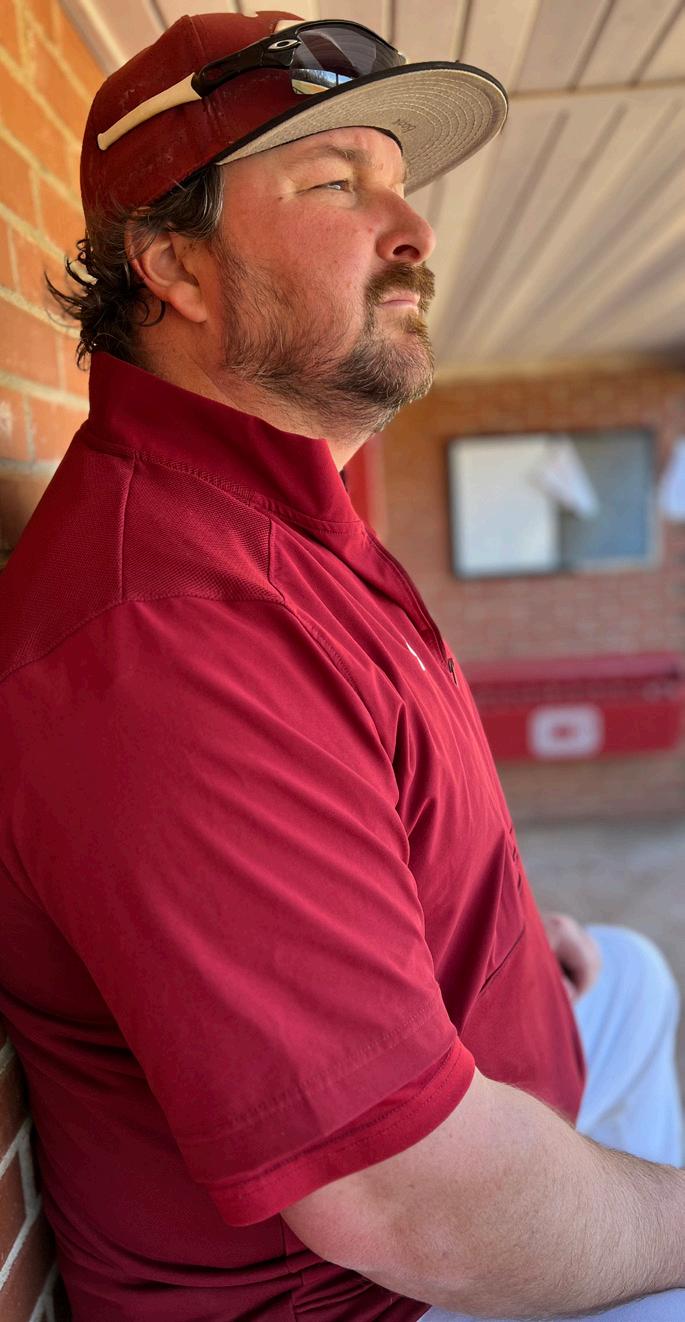
There was never a Plan B for Zach Booker — only Plan A. He’s living it at Guilford.
LITTLE ZACH BOOKER WAS JUST LIKE HIS FATHER and grandfather: obsessed with baseball. From the time he could put a bat on his shoulder, Zach was looking for a pitch to hit. Father, grandfather and son would head out to the garage for batting practice in a cage, and because Greg Booker and Jack McKeon had spent a lifetime playing and coaching at the game’s highest level, they appreciated what they were witnessing: wiffle ball after wiffle ball being punished by a 4-year-old.
“You could tell from an early age baseball was going to be part of Zach’s life,” says Jack McKeon, Zach’s grandfather. “I’m not going to say it was in his blood, because you have to work for it. But Zach grew up around the game. All those years around the game and it’s going to rub off on you.”
Little Zach Booker is Big Zach Booker these days. And, yes, safe to say the game rubbed off on him. As Guilford’s fourthyear baseball coach, Zach is hoping what he picked up from a childhood spent in major league dugouts rubs off on his players. “I don’t have all the answers, but I’ve seen what works for some people who have been very successful in the game and I want to pass that along to my players,” says Zach. “That’s what all good coaches do. They teach.”
To say that baseball runs deep in the roots of Zach’s family tree is an understatement best appreciated when you step back and look up at the tree. Grandfather Jack is a former Major League general manager for the San Diego Padres, who later managed the Kansas City Royals, Oakland A’s, Cincinnati Reds and Florida Marlins. In 2003, Jack took over managing the last-place Marlins early in the season and led them to a World Series title over the New York Yankees.
Zach’s father and Jack’s son-in-law, Greg, was a major league pitcher and, later, pitching coach for the San Diego Padres and a scout for the Los Angeles Dodgers. Avery Booker, Zach’s brother, was once the head coach at nearby Greensboro College and now coaches a high school team in the city. Cousin Kellen McKeon is a scout for the Philadelphia
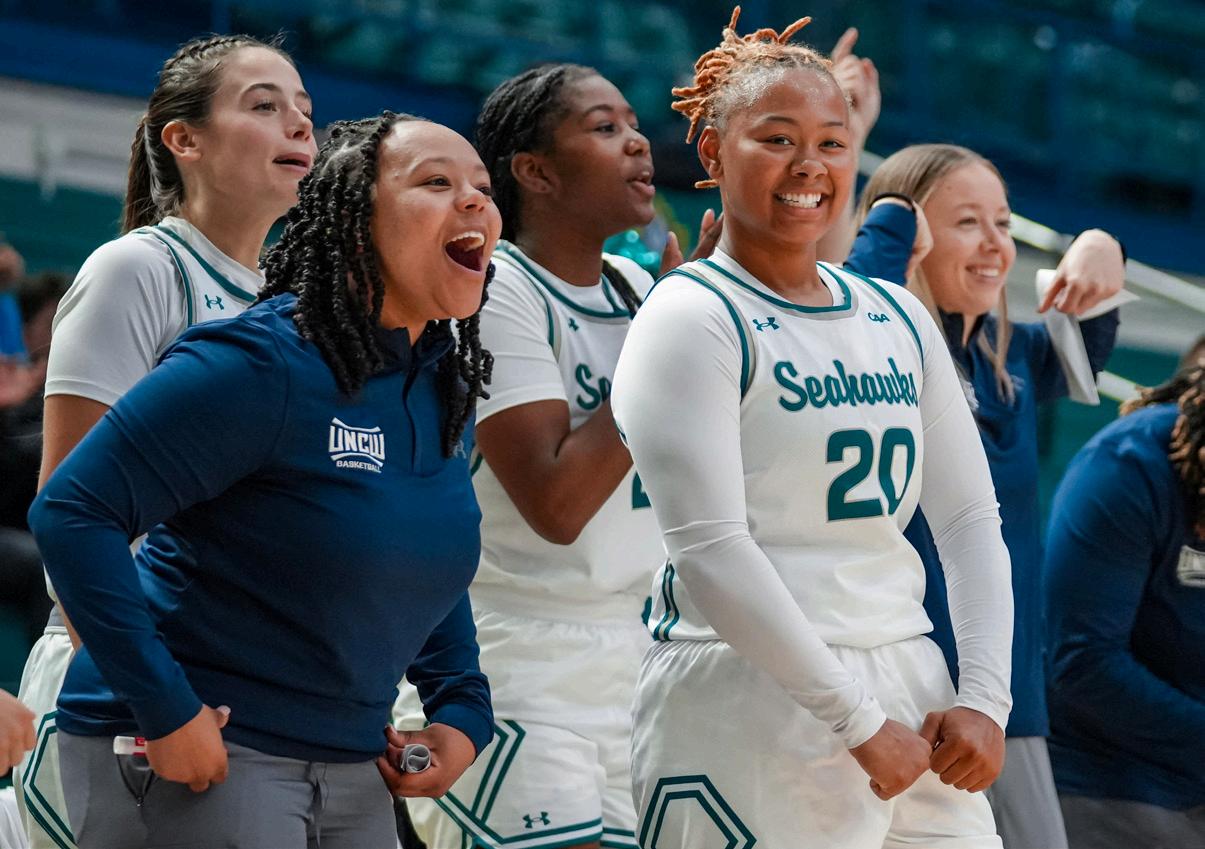
Brittany Drew ‘15 always dreamed of coaching basketball. She learned if you paste it, it will come.
BRITTANY DREW ’15 IS BIG INTO visualization. You know what I mean: she’s one of those people who imagines what success looks and feels like, using those visuals as motivation to achieve her goals.
But what if your dreams are so vast that even your imagination struggles to contain them?
A few months before graduating from Guilford, Brittany, a four-year standout on the women’s basketball team, saw her playing career winding down. Next stop: the real world. She created a vision board, covering it with aspirational words and images.
“I was feeling a little empty and knew I needed a plan,” Brittany says. “I started
thinking about what I wanted to do with my life and writing everything down — like a big checklist.”
One of her biggest goals was to start a nonprofit. But before she could put that on her board, another dream emerged: helping young women athletes train properly. Maybe even starting a youth basketball league. So many goals, so
THE EMAIL ARRIVED IN JANUARY
Bryan Dooley ’13 holds on to it not as a reminder of how far he’s come but rather how much farther he can go. The email was from the White House during the Biden Administration’s final days. Bryan had been appointed as an incoming member of the President’s Committee for People with Intellectual Disabilities.
He will serve a two-year term on the committee that provides advice and assistance to the President and the Secretary of Health and Human Services on a broad range of topics that impact people with intellectual disabilities.
Bryan’s work in the private sector as the community inclusion specialist at Solutions For Independence in WinstonSalem, N.C., and as a former board member for the North Carolina Council on Developmental Disabilities has always focused on helping people with disabilities become self-advocates in all aspects of life.
“This appointment will help me do the same thing with a bigger impact,” says Bryan. “It’s a great honor, a great opportunity for me because I have always wanted to make a big, positive impact on people with disabilities.”
Former President Lyndon B. Johnson established the President’s Committee For People with Intellectual Disabilities in 1966. The committee works to improve the quality of life of people with disabilities, upholding full citizenship rights, independence, self-determination and lifelong participation within the broader community.
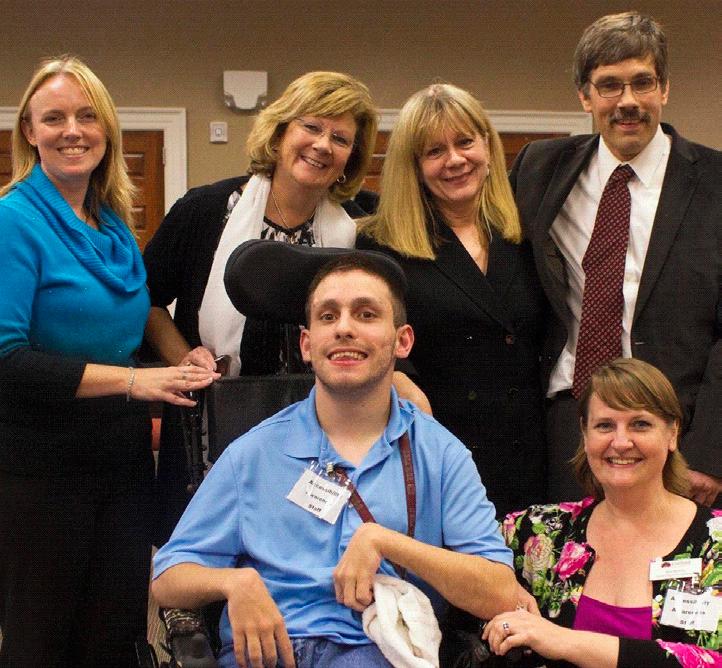
“It’s a great honor, a great opportunity for me because I have always wanted to make a big, positive impact on people with disabilities..”
— Bryan Dooley ’13
Between 7 and 8 million Americans, or 3% of the general population, experience intellectual disabilities, according to the Administration for Community Living. Nearly 1 in 10 families in the U.S. are directly
affected by a person with intellectual disabilities at some point in their lifetimes.
Bryan, who has cerebral palsy, wasn’t sure about attending Guilford but orientation as a first year put him at ease. “There were so many people on campus to help me if I needed the help,” he says. “I never felt any opportunity wasn’t available to me.”
By the time he graduated, Bryan was a member of The Guilfordian staff, the Student Government Association and several clubs. “I was one of the most connected students on campus,” he says. “If I can make other colleges and universities more like Guilford in this new role, that would be great.” •
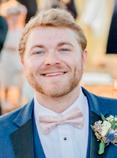
Taylor Kickler ’19 recently accepted a position as project manager at Enviroserve, a waste management company in Virginia. Before that, Taylor worked as a senior project manager at First Call Environment. He received a Business Administration degree and played football at Guilford and later served as an assistant football coach.
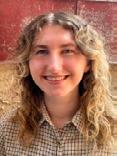
Annika Norris ’20 recently joined the National Children’s Alliance as a communications coordinator. The alliance is the nation’s largest network of care centers serving child victims of abuse. Before that Annika held a similar position with Benefits Data Trust. She was a double major in English Language and Literature at Guilford.
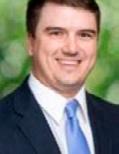
Dylan Tuttle ’20, a supervisor at the Greensboro accounting firm of Bernard Robinson & Company, recently earned his certification as a Certified Public Accountant. Dylan received his Accounting degree from Guilford and later received his master’s in Accounting from Elon University. He has worked at Bernard Robinson in several positions for the past 14 years.
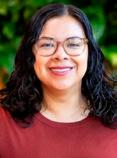
Yazmin Garcia Rico ’11, Director of Community Engagement and Impact for the Cone Health Foundation in Greensboro, was named to the Triad Business Journal’s 2025 Class of 40 Under 40. Yazmin received a degree in French from the College. She went on to receive a master’s in Social Work at the University of North Carolina at Chapel Hill.
Share your news with classmates and friends! Submit your Community Notes online to magazine@guilford.edu. The deadline for the October 2025 issue is September 1.


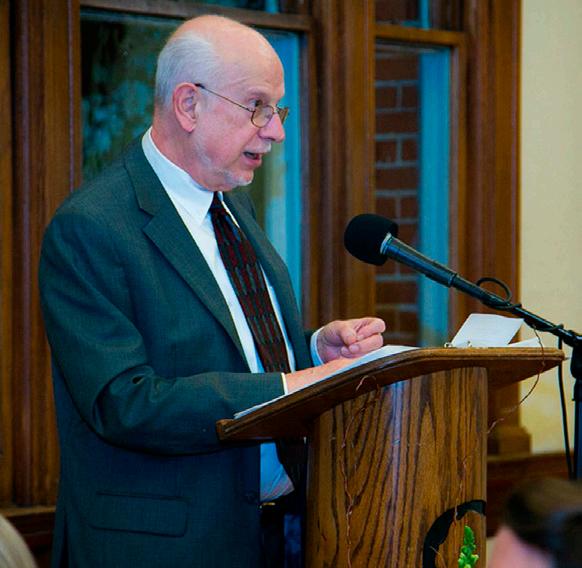
Tony Blake, a long-time ardent supporter of Guilford, and especially of Hege Library’s vision as an “Academic Commons,” died Jan. 11. He was Clerk of the Friends of the Library Board beginning in 2006 after serving with the group for a number of years. Tony and his late wife Barbara established the Anthony and Barbara Blake Scholarship.

John Rufus Massey ’50, a World War II veteran who served under General Patton in Northern Italy and went on to a distinguished career with Bell Laboratories, died Jan. 23. A man of deep faith, John cherished his family, was an avid golfer, and proudly led Gwinnett County’s (Ga.) Veterans Day Parade as one of its oldest veterans.


Mike Stallings ‘60, who spent more than three decades as an engineer for Western Electric and all the various new names that accompanied it, died Jan. 8. After an honorable discharge from the Navy, Mike enrolled at Guilford, where earned a degree in Physics. Mike worked hard and played harder. He was an avid boater and an enthused automobile buff. He alslo loved music and was a member of a barbershop quartet.
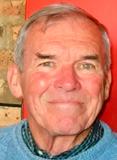
Michael Stephen James ’70, a Guilford County Magistrate for 28 years, died Jan. 4. Michael served as a Criminal Justice Planner for the Piedmont Triad Council of Government in Greensboro. He directed the Selective Traffic Enforcement Program through the Governor's Highway Safety Program and, years later, went on to serve as CoPrincipal & Instructor for the Saudi-Arabian Traffic Safety Project.
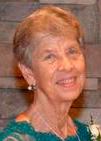
Jane Coltrane Norwood ’62 , a former Chair of the Alumni Board, died on Jan. 14, 2025. Jane loved Guilford College. That love was on display through her work. She played a pivotal role in the restoration of Mary Hobbs Hall. During her nearly three-decade career at Rockingham Community College, she developed the Career Center and spearheaded career counseling programs statewide. She helped found Rockingham Friends Meeting.
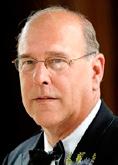
Harry James Ferguson III ’74, who spent 24 years at Merrill Lynch before retiring as Executive Vice President of Global Real Estate and Design, died Jan 23. Harry was one of the founding partners of a private golf club in Pennsylvania. He devoted much of his time to the club, where he held multiple leadership roles. Harry was incvolved in the community and volunteered and many nonprofits in his hometon of Plumstead, Pa.

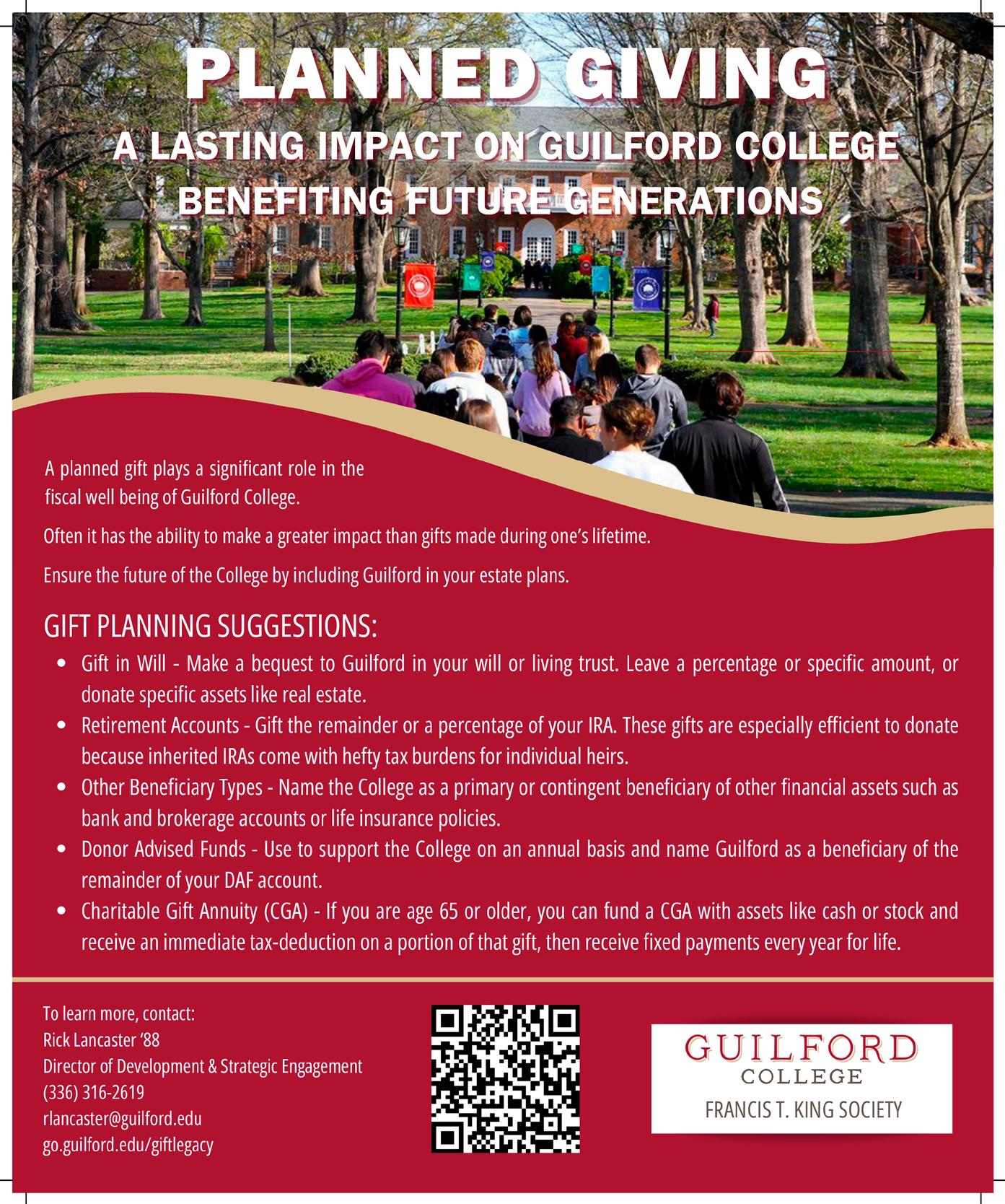


September 26-28, 2025 September 26-28, 2025
